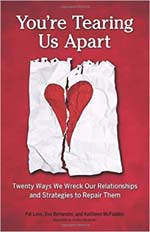Communication and negotiation are two main factors in a good relationship. This looks like two adults bringing their best to each other with mutual respect and consideration. No one wants to be controlled or bullied in a relationship. This article by Pat Love from her book “You’re Tearing Us Apart” makes us understand what is behind a “controller” and what to do about it.
“Your Controlling Behavior Is Tearing Us Apart”
“I feel like I’m living in a vice. I can’t move right or left, forward or backward, without you getting upset or somehow correcting me. I’ve avoided this subject for a long time because I don’t want your anger, your criticism, or your silent treatment, but I’m worn out and worried that it’s getting worse.
Living with you is not fun anymore: in fact it’s like walking on eggshells. I find myself giving up more and more of my life because of your “my way or the highway” attitude.
You don’t trust me or how I do things. Or maybe you just think I’m stupid. You act like your opinion is always the right one and none doesn’t matter. I’ve given up so many things that are important to me just to keep peace with you – but it’s never enough.
If this sound like an exaggeration, please think about it. Think about how many of my friends and family you don’t like and don’t want me spending to me with: how many of my activities I’ve cut short or cut out because you don’t approve. And you always seem to be upset when I have fun without you.
I know you are smart. I know you have good ideas, and most of the time I know you love me, but your need to control my behavior is suffocating me and snuffing the life out of our relationship.
The Purpose Behind Controlling Behavior
The most common reason why we try to control another person’s behavior is to manage our own anxiety or insecurity. We feel safer and less vulnerable when everything happens as expected. This fact easily goes unnoticed because it’s largely unconscious. What others see as controlling is often seen as doing the right thing to the person in control, or at least doing it in a better way.
Those blamed for being controlling are often confused by this accusation. They see what they believe to be the best course of action and are incredulous when others don’t see it the same way. Motivated by the desire to help, partners who are controlling come on strong with suggestions and work hard to gain compliance.
 Controlling behavior also can be compensation for a time or situation when the partner had no control such as growing up, a stressful job, or a former relationship. Living without personal control can increase the motivation to seize control whenever possible.
Controlling behavior also can be compensation for a time or situation when the partner had no control such as growing up, a stressful job, or a former relationship. Living without personal control can increase the motivation to seize control whenever possible.
The most severe forms of control are motivated by emotional dysregulation, which is the inability to manage our own feelings. In an attempt to avoid the fear of abandonment or the shame of inadequacy, the controlling partner resorts to extreme emotions such as anger, rage, threats, and even emotional or physical abuse.
The primary difference in modern twenty-first century couples and those in the past is the level of equality, equity, freedom and autonomy. Relationships thrive when each individual has the liberty to develop and grow as a person and a partner. This evolving process generates energy that keeps both partners interested and excited about a future together.
When one partner tries to control or limit the other’s choices, excitement is replaced by resentment, which is the number one cause of growing apart, and growing apart is cited as the most common reason for divorce and separation.
Once resentment enters a relationship, excitement fades, passion wanes, and anger is never far behind. Good feelings and effective communication go out the window, while criticism, defensiveness, and withdrawal seep in. When negative exchanges begin to outweigh the positives, the relationship is in serious trouble of tearing apart.
Transforming Controlling Behavior
Sometimes controlling behavior is simply a habit. The best way to break a habit is to form a new one. Developing a “no advice” policy might be just the right approach to replace the old pattern.
 As soon as you catch yourself trying to control your partner, stop and apologize: ”There, I did it again, I’m sorry”. It’s also a good idea to tell them what you are sorry for so they know you “got it”.
As soon as you catch yourself trying to control your partner, stop and apologize: ”There, I did it again, I’m sorry”. It’s also a good idea to tell them what you are sorry for so they know you “got it”.
Apology goes a long way if you are sincere.
Instead of directing, or trying to influence your partner to what you want, simply say “oh” (to de-escalate you and show a noncommittal neutral stance) or “tell me more about how you think about that”. You might discover a great deal of wisdom in your partner’s perspective- especially if you’re more willing to be loving than to be right.
Most controlling behavior is fueled by anxiety or fear: therefore, you must learn to manage those feeling within yourself instead of trying to manage your partner’s behavior. Emotional regulation gives you control of what happens in your mind and your own behavior. Trying to control your partner’s life will wear you out and tear down your relationships. If the old pattern of controlling starts up, call a time-out. You can’t have an argument over control when one person refuses to participate.
If you’re the partner feeling controlled, then it’s your responsibility to speak up! Silence enables the behavior to continue. You might be more aware of the controlling behavior that your partner. Work together to agree upon a kind way to signal when the pattern re-emerges. Develop a redirect strategy to replace the old habits For example: when I life my hand in the stop position, I’d like you to be quiet and let me finish what I am doing.”
If you do not feel safe or competent to talk with your partner about the issue of control, take this as a sign to seek professional help.

